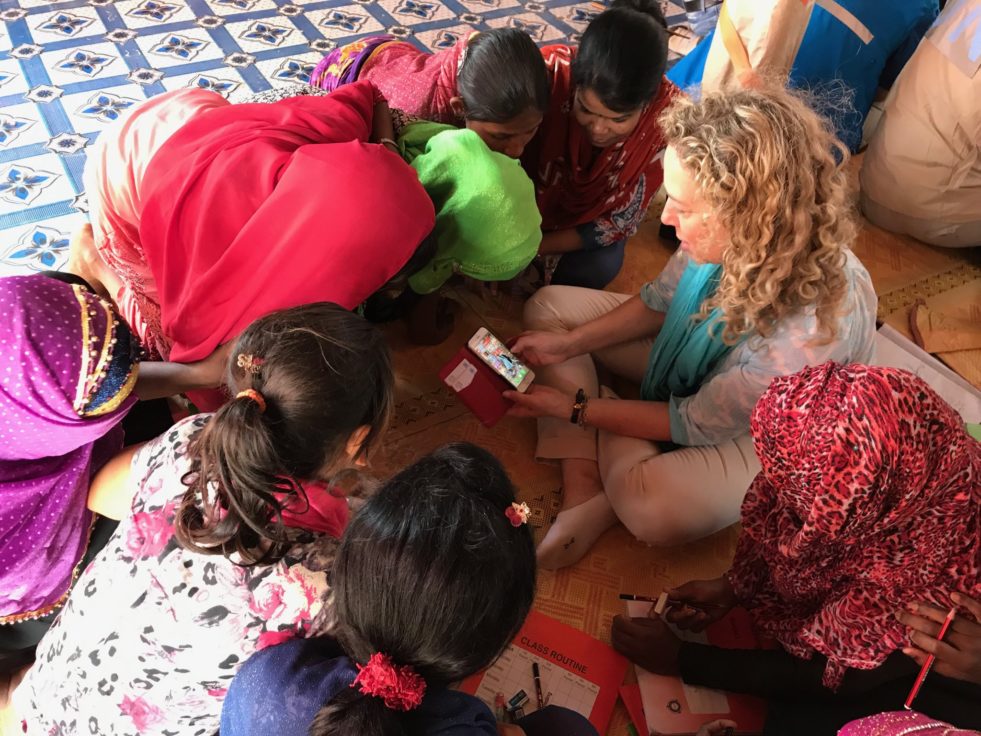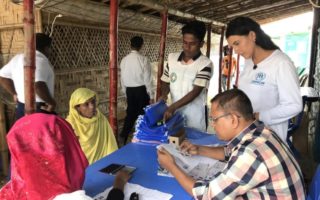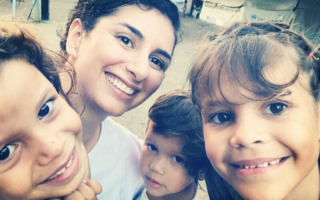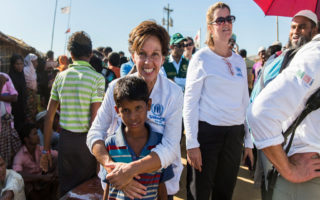
UNHCR’s Director of External Relations Dominique Hyde shares a photo of her daughter with Rohingya refugee girls during a visit to UNHCR’s local partner, Community Development Centre (CODEC) at Chakmarkul refugee settlement in Bangladesh in March 2019. © Dominique Hyde via Twitter
“It was very emotional”
By Dominique Hyde, as told to Lauren La Rose
Ottawa native Dominique Hyde has spent more than two decades dedicated to front-line humanitarian work, with organizations including UNICEF and UN’s World Food Programme.
She met with Rohingya refugees in Bangladesh on her first mission for UNHCR in March 2019 in her new role as Director of the Division of External Relations. She describes why her meetings with young women in particular struck a deeply personal chord.
We’ve seen from UNHCR’s Her Turn report the importance of educating girls and young women. Can you tell us about the impact that education makes on their lives?
When I met these girls, what I understood is they hadn’t had access to education because they were living in a really challenging situation in Myanmar. This was their first time accessing even basic education: learning to read, write, learning basic skills of life that are necessary; and also giving them a bit of a break because often they’re also helping the whole family and the younger kids. So it’s also that moment where they can be with their friends and just be children, and that opportunity is extraordinary.
We’ve seen programs where young girls and women are learning how to sew, and how that can help in terms of their economic empowerment and advancement, and, in turn, help their families.
The majority of Rohingya families living in the refugee camps are women-headed households because their husbands have disappeared or died. And so there needs to be a lot more hope and opportunities for the mothers, but also for the young girls and young men growing up to be able to actually support their families.
You shared a lot of really great photos on social media during your mission to Bangladesh. One that really stuck out was a photo of you showing a group of young Rohingya women a picture of your daughter. How did that experience resonate with you?
It was very emotional. My eldest daughter is 16, and I was showing the girls a picture of her and telling them how she’s about to go to university. These girls at the same age won’t have the same opportunities unless we support them, and even then it will be challenging. Obviously, it gets you sad. It gets you thinking about what a lucky person my daughter is being born Canadian and having that opportunity to thrive and grow in a country like Canada versus these children who haven’t. They’ve probably seen things that none of us want any of our children to ever see.
“This was their first time accessing even basic education”
You had the chance to meet with Rohingya children who were training to facilitate sessions on mental health.
We’re working with young schoolchildren between the ages of eight and 12 to be peer supporters: to help children who may be suffering from depression, or who might be just having a bad day, and encouraging them to speak; and training them to be aware when they do see some challenges, to then bring [the children] to the clinics where we have psychologists, psychiatrists, and more support.
Many of the Rohingya refugees have gone through situations like torture, and sexual exploitation, in some cases as bad as rape. And this, of course, has impacted their parents. So you want to be in a situation where children have a space where they can speak freely and where we can really provide them with the mental health support that is needed; but also for those parents, because children are only going to thrive if their parents are also in a good place. So we need to be investing much more in mental health, not just in Bangladesh, but globally.





